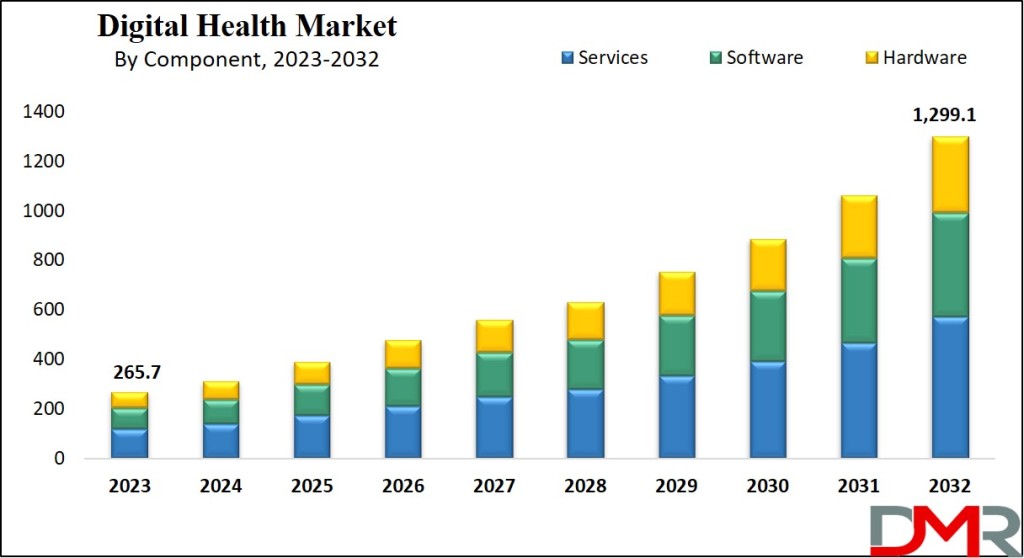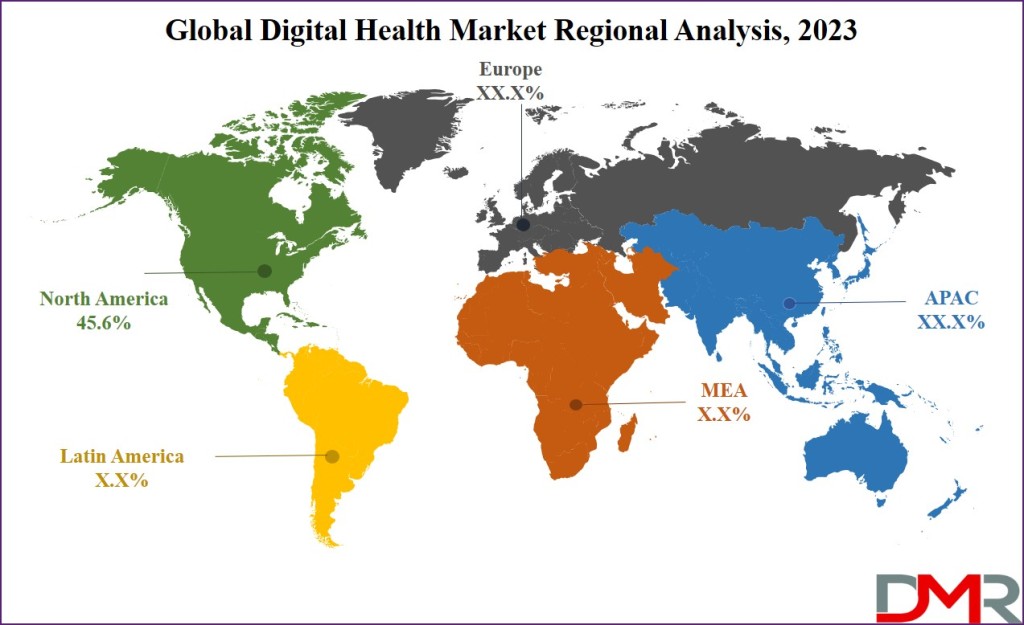Digital Health Market Exploring the Landscape
In recent years, the Digital Health Market has witnessed remarkable growth, driven by advancements in technology, changing consumer preferences, and a growing focus on personalized healthcare solutions. With the convergence of healthcare and technology, the global digital health market is poised for exponential growth, offering innovative solutions to improve patient outcomes, enhance healthcare delivery, and streamline medical processes. This article delves into the various facets of the digital health market, exploring its growth drivers, market dynamics, key players, and regional trends.
Understanding the Growth Trajectory
Market Dynamics
The Global Digital Health Market is on a robust growth trajectory, with forecasts indicating substantial expansion in the coming years. The market is expected to reach a value of USD 265.7 billion in 2023, and projections suggest a remarkable surge to USD 1,299.1 billion by 2032, representing a CAGR of 19.3%. This exponential growth is attributed to several factors, including the increasing demand for personalized healthcare solutions, technological advancements, and the integration of digital technologies into healthcare systems.
Personalized Healthcare Solutions
Digital health aims to revolutionize healthcare delivery by leveraging technology to provide personalized solutions tailored to individual patients. This approach involves the use of wearables, smartphones, electronic health records (EHRs), and machine learning algorithms to gather patient data and offer customized treatment plans. By analyzing factors such as genetics, lifestyle, and environmental influences, healthcare providers can optimize treatment outcomes and facilitate early intervention, thereby driving market growth.
Technological Advancements
Advancements in technology, particularly in the fields of telehealth, mobile health (mHealth), and healthcare analytics, have fueled the expansion of the digital health market. Telehealth services, including remote patient monitoring and telemedicine, have witnessed significant adoption, enabling real-time healthcare delivery and improving access to medical services. Similarly, the proliferation of mHealth apps and wearables has empowered individuals to take charge of their health and wellness, further driving market growth.
Visit For a Free PDF Sample Copy@ https://dimensionmarketresearch.com/report/digital-health-market/request-sample

Key Takeaways:
- Digital Health Market Growth: The global digital health market is projected to reach USD 265.7 billion by 2023 and is expected to surge to USD 1,299.1 billion by 2032, driven by technological advancements and increasing demand for personalized healthcare solutions.
- Technological Innovations: Advancements in telehealth, mHealth apps, and healthcare analytics are revolutionizing healthcare delivery, enabling real-time monitoring, remote patient care, and data-driven decision-making.
- Regional Dominance: North America leads the digital health market, driven by early adoption of smart healthcare solutions and government initiatives to promote healthcare digitization. However, regions such as Europe and Asia-Pacific are also witnessing significant growth.
- Market Dynamics: Factors such as the growing prevalence of chronic diseases, the need for remote patient monitoring, and the convergence of healthcare and technology are driving market expansion.
- Key Players: Prominent players such as Cisco, AT&T, and Cerner Corp are driving innovation and market growth through research and development, strategic partnerships, and mergers and acquisitions.
Factors Driving the Digital Health Market Growth:
- Technological Advancements: Continuous advancements in technology, including telehealth, mobile health (mHealth) apps, wearable devices, and healthcare analytics, are driving the expansion of the digital health market. These innovations enable real-time monitoring, remote consultations, and personalized healthcare delivery.
- Increasing Demand for Personalized Healthcare Solutions: There is a growing demand for personalized healthcare solutions tailored to individual patient needs. Digital health technologies facilitate the collection and analysis of patient data, allowing healthcare providers to offer customized treatment plans and interventions.
- Government Initiatives and Support: Governments worldwide are actively promoting the adoption of digital health technologies to improve healthcare access, quality, and efficiency. Initiatives such as healthcare digitization programs, telemedicine reimbursement policies, and investment in healthcare IT infrastructure drive market growth.
- Rising Prevalence of Chronic Diseases: The global increase in chronic diseases such as diabetes, cardiovascular diseases, and respiratory disorders is driving the adoption of digital health solutions for remote patient monitoring, disease management, and preventive care. These technologies help patients manage their conditions effectively and reduce healthcare costs.
Regional Analysis
North America
North America dominates the digital health market, accounting for a significant share of global revenue. Early adoption of smart healthcare solutions, including wearables, mobile apps, and EHR systems, has facilitated remote access to critical healthcare information. Factors such as smartphone proliferation, advances in network coverage, and a growing elderly population are driving market growth in the region. Additionally, initiatives to improve chronic disease management and healthcare digitization further propel market expansion.
Buy This Report Here Click Here@ https://dimensionmarketresearch.com/checkout/digital-health-market

By Region
North America
• The U.S.
• Canada
Europe
• Germany
• The U.K.
• France
• Italy
• Russia
• Spain
• Benelux
• Nordic
• Rest of Europe
Asia-Pacific
• China
• Japan
• South Korea
• India
• ANZ
• ASEAN
• Rest of Asia-Pacific
Latin America
• Brazil
• Mexico
• Argentina
• Colombia
• Rest of Latin America
Middle East & Africa
• Saudi Arabia
• UAE
• South Africa
• Israel
• Egypt
• Rest of MEA
Market Segmentation
By Component
The digital health market comprises three main components: services, software, and hardware. Services, which encompass staffing, training, installation, and maintenance, account for a significant share of market revenue. The rapid adoption of software solutions, driven by hospitals, patients, healthcare providers, and insurance payers, is expected to fuel further growth in this segment. Additionally, advancements in AI and machine learning are enhancing the customization of healthcare, driving demand for software solutions.
By Technology
Telehealthcare and remote patient monitoring emerge as key technologies driving market growth. Telehealth services, including tele-care and telemedicine, offer accurate health monitoring, secure data storage, and real-time population management. The integration of diverse platforms for monitoring, diagnosis, and disease prevention is further expanding the market. Remote patient monitoring, facilitated by advancements in technology and government initiatives, is gaining traction, particularly for chronic disease management.
Recent Development:
- In 2023: The global digital health market size reached an estimated USD 244.34 billion, with a projected 18.3% CAGR from 2024 to 2030.
- In 2024: The market is expected to reach USD 284.53 billion.
- In 2024 (ongoing): Increased focus on mental health solutions as a growing segment within the market, driven by rising awareness and demand for accessible mental healthcare.
- In 2024 (ongoing): Growing integration of artificial intelligence (AI) in various aspects of digital health, such as personalized medicine, disease prediction, and drug discovery.
- In 2024 (ongoing): Regulatory advancements and increased government support for digital health adoption in certain regions.
Market Key Players
Several key players contribute to the growth and innovation within the digital health market. These include:
- Cisco System Inc
- AT&T Inc
- iHealth Lab Inc
- Cerner Corp
- McKesson Corp
- Athenahealth Inc
- EClinicalWorks
- BioTelemetry Inc
- Allscripts Healthcare LLC
- GE HealthCare
Frequently Asked Questions (FAQs)
1. What is digital health, and how does it impact healthcare delivery?
Digital health encompasses the use of technology to improve healthcare delivery, enhance patient engagement, and personalize medical treatment. It includes solutions such as telehealth, mHealth apps, and healthcare analytics, which enable real-time healthcare services and data-driven decision-making.
2. What are the key drivers of growth in the digital health market?
The digital health market is driven by factors such as increasing demand for personalized healthcare solutions, technological advancements, and government initiatives to digitize healthcare systems. Additionally, the growing prevalence of chronic diseases and the need for remote patient monitoring contribute to market growth.
3. How does telehealth contribute to market expansion?
Telehealth services, including telemedicine and remote patient monitoring, facilitate remote access to healthcare services, enabling patients to consult with healthcare providers, monitor their health, and receive timely interventions. The convenience and accessibility offered by telehealth solutions drive market expansion.
4. Which regions are witnessing significant growth in the digital health market?
North America leads the global digital health market, driven by early adoption of smart healthcare solutions and government initiatives to promote healthcare digitization. However, regions such as Europe and Asia-Pacific are also experiencing rapid growth, fueled by increasing investments in healthcare IT infrastructure.
5. What role do key players play in shaping the digital health market?
Key players in the digital health market contribute to innovation, product development, and market expansion. By investing in research and development, strategic partnerships, and mergers and acquisitions, these players drive technological advancements and market growth.
Conclusion
The Digital Health Market holds immense potential for growth and innovation, driven by advancements in technology, increasing demand for personalized healthcare solutions, and evolving consumer preferences. With the convergence of healthcare and technology, the market is poised to revolutionize healthcare delivery, improve patient outcomes, and transform the healthcare landscape globally. As key players continue to innovate and governments invest in healthcare digitization, the future of digital health looks promising, paving the way for a healthier and more connected world.














